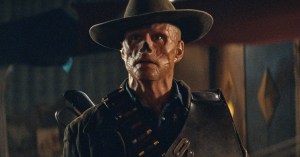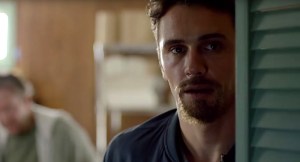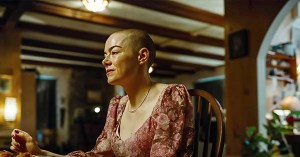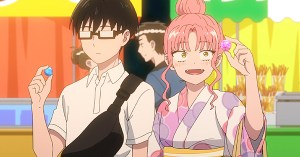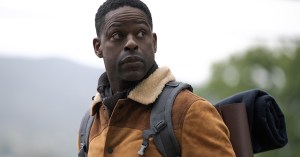RT-UK: Richard Eyre – Director’s Masterclass II
Sir Richard Eyre takes Rotten Tomatoes UK through Notes on a Scandal.
 Sir Richard Eyre is starstruck – albeit in a way befitting a Knight of the Realm – and yet he’s the biggest draw in the room. As Rotten Tomatoes UK shakes hands with Eyre we discover he’s a regular visitor to the site. “It’s much more accessible than IMDb,” he gushes, “I like it because you can see reviews at a glance. I don’t like to read reviews in detail, to be honest, because you just can’t get rid of them!”
Sir Richard Eyre is starstruck – albeit in a way befitting a Knight of the Realm – and yet he’s the biggest draw in the room. As Rotten Tomatoes UK shakes hands with Eyre we discover he’s a regular visitor to the site. “It’s much more accessible than IMDb,” he gushes, “I like it because you can see reviews at a glance. I don’t like to read reviews in detail, to be honest, because you just can’t get rid of them!”
But enough about us, we’re here today to find out about one of the best reviewed films to arrive in UK cinemas so far this year, the Certified Fresh masterpiece that is Notes on a Scandal. Adapted from the popular book by Closer scribe Patrick Marber, it tells the tale of Barbara Covett (Judi Dench) and her obsession with a new art teacher at her comprehensive school, Sheba Hart (Cate Blanchett).
It’s Eyre’s sixth feature film, following on from the critical successes of Stage Beauty and Iris. In the second of our Director’s Masterclass special features, Eyre goes behind the scenes exclusively with Rotten Tomatoes.
RT-UK: How did your involvement in Notes on a Scandal come about?
Richard Eyre: I’d read the book and Scott Rudin, the producer, called me not long after we’d done Iris. Scott was one of the producers on Iris. He said he’d bought the rights to the book and that he thought it was a great part for Judi. He also said he was going to get Patrick Marber to write the screenplay. I’d sort-of started Patrick off as a playwright when I was running the National Theatre. I commissioned Dealer’s Choice and Closer at the National. In fact I’d let Patrick direct his own plays! [Laughs] But I’d always wanted to direct his work so it was great, it was a very happy marriage really.
About two years later the script turned up.
RT-UK: Having been so aware of the book, what did you think when you read the script?
RE: I thought the big, big challenge, having read the novel, was how to tell the story on screen. The novel is in the first person and it’s a classic unreliable narrator character. The technical challenge of how you translate that into film was what I was most interested in. There was a certain amount of voiceover – probably more than there is now – but voiceover and flashback and I thought he’d used both in an incredibly inventive way.
RT-UK: It must be very difficult to adapt a book like this without resorting to cinematic clichés to spell things out that are perhaps simply implied in the book.
RE: Yes, but you have to remember that the what you see on screen is not necessarily the screenplay as written or as directed! [Laughs] By which I mean that there was an awful lot in the script – and that we shot – that we thought was absolutely essential to the story and that we discovered later wasn’t at all.
RT-UK: Does that happen a lot or was it just this project?
RE: I think it’s true of most films. The trouble is, when you read a published screenplay, it’s the edited screenplay. What would be more interesting would be to read the screenplay before shooting and the screenplay when the film is finished. But it was no less good but there was an awful lot of stuff that we discovered was either repetitious or going in the wrong direction or a cul-de-sac.

RT-UK: Is there a feeling of happy accident when you discover something that you’d planned differently actually turns out better?
RE: Yeah; there’s happy accident and unhappy accident. Sometimes you think it’s absolutely perfect that you’ve put this scene next to that and then you put them together and they’re just less than the sum of the parts. And sometimes you move things and you say, “Well, let’s try that scene there and move that,” and then there’s some wonderful accumulation effect.
RT-UK: At the same time does that ever lead to a situation of doubt when you realise you hadn’t shot something you wanted to?
RE: Oh sure but there was, shrewdly, money in the budget for us to shoot some additional material.
RT-UK: Now that the film is finished, are there any regrets?
RE: [Laughs] I look at things and I think, “I could have done that differently…” I mean, I really love the film, but I can’t allow myself to think, “Oh, I wish I’d done that,” otherwise it’d just be torture. If I watch it now, I just like to get the pleasure out of the good luck I had that things worked out well. It always seems to me a bit of a miracle when a film comes together; it’s so hard to get a film made and when a film is made it’s so hard to make it good! [Laughs]
RT-UK: I guess I ask because I can imagine you become so invested in the project for such a long time and there’s always a clear end to your involvement because the film eventually has to come out; it must be very, very difficult to be able to switch off and just enjoy it.
RE: It is, and I’m still at the stage of marvelling that it turned out well and grateful that it did. It was hard – everything about it was hard – because I think the subject matter was difficult. It wasn’t easy to film and I’m sure Patrick will say it wasn’t easy to write. It wasn’t easy to find its final form. So I’m all the more delighted that it turned out well!

RT-UK: The talent involved in the film is just incredible; does it make life easier for you when you’re working with such talented and experienced actors?
RE: Yes, I mean, a lot of directing anyway is making choices that you are encouraging people, coaxing them along that direction – and it may be the direction they’re going anyway – but it’s about those choices and saying, “Can you try that rather than that.” But most directing is not loud-hailer stuff. It’s not, “DO THAT! YOU’VE GOT TO DO THAT!” It’s more a question of acting like a poultice that you’re saying, “More of that, more of that; please don’t do that – when you do that it looks X, Y or Z or the character becomes more unsympathetic or that doesn’t seem truthful.” It’s adjusting.
Cate and Judi are fantastically well prepared and they’re prepared both in very different ways. Judi prepares in a sort-of invisible way and relies very much on informed instinct whereas Cate is more systematic. She makes tremendous amount of study of the script and gives a great deal of thought and makes notes and research. In the end, though, both of them have this great gift to put all that aside, as it were, and when the camera’s turning they’re spontaneous. They appear to be making it up as they go along.
RT-UK: What’s interesting about the project is there seems to be no ego involved at any stage; it’s not Judi’s film or Cate’s film or your film, it’s very collaborative and that’s a very good thing.
RE: Right, but it’s important not to forget about the contribution of the producers, Scott Rudin and Robert Falks. Scott who had the vision to buy the book and to put the project together and was very, very much involved during pre-production, shooting and post-production. So it is collaborative – it has to be – and ultimately very, very few films are auteuristic in the way that an Ingmar Bergman film is unquestionably his film.
RT-UK: There’s also something between Judi and Cate that elevates both performances; a chemistry that really sells the relationship they have.
RE: They’re just very, very bright performers. Also we had two weeks of rehearsal just with the two of them, Patrick and myself. I think that helped enormously.
RT-UK: Did you ever have anyone else in mind? They’re both greatly in demand; did you have a fallback?
RE: Absolutely not. Judi was always in mind, from the moment I got the book. Cate always seemed perfect.
RT-UK: You also found a young actor in Andrew Simpson who was able to share the screen with these phenomenal actors and never get drowned by them; where did he come from?
RE: We saw an awful lot of actors. I thought it was going to be easy. [Laughs] I thought we were going to go into a North London school and find the new Gary Oldman. And it was just really, really hard. We must have seen about three-hundred boys. He came through the recommendation of an agent in Belfast. He’d been in one film before, which was about brutality in a Jesuit seminary, when he was fourteen I think. And he’s genuinely good. Again, the big thing with him was just sort-of managing his confidence; just making him feel he could do it. Cate was brilliant with him, in terms of endowing him with a sexual allure, that’s so much her generosity.
RT-UK: The weight of the taboos that the film is tackling is a lot to put on the shoulders of a young actor.
RE: He was just sixteen when we started and he’s just quite grown-up about it. He’s a bright boy; he’s not a silly boy at all. He’s really quite impressive.
RT-UK: His character isn’t Irish in the book, is he?
RE: No, he’s called Stephen Connelly so he might be first generation. But the school we were filming in he would have fitted in perfectly because virtually everybody in the school was a first generation immigrant. From Bosnia, from Bulgaria, Ukraine, Bangladesh, Sudan, I mean all over; this very, very mixed community.

RT-UK: Is it still exciting to hear talk of awards?
RE: Yeah, it’s pretty good! [Laughs] No, it’s great!
RT-UK: But you’re not so keen on reading the reviews in full…
RE: Well the truth is, if the reviews are good I think, ‘What a relief!’ And if they’re bad, I find them really upsetting. I’ve been directing films, and before that in the theatre and on television, for a long, long time and it doesn’t get any easier. I don’t get any more confident. If anything I get more disturbed by bad criticism.
RT-UK: The arts, I guess, is one of the few fields in which you can get away with criticising another’s work so publicly. It must be hard to have to deal with criticism all the time, even sometimes if it’s positive criticism…
RE: Yeah, and occasionally you do things that are universally liked and you think it’s safe to read them and you’ll always find one review saying bad things. It’s just like a shard of ice in the heart.
RT-UK: Ultimately you’re always going to find a dissenting voice.
RE: That’s right, that’s the thing. The last film I did was Stage Beauty, and all the advance reviews were wonderful. And then the dailies were pretty bad. I was so shocked because I loved the film!
RT-UK: I’ve often found the dailies tend to hit a consensus which I think is the product of them all seeing the film at the same time.
RE: Yeah, and it’s usually on a cold Monday morning at 10:30. [Laughs]

